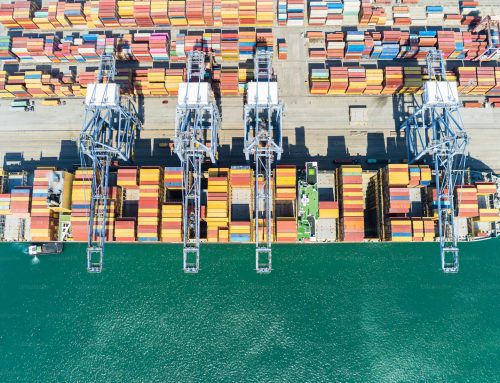Anna Dziuba, Ph.D.
Associate postdoctoral researcher at the HUMLOG Institute

We started interviews with displaced persons from the Ukraine conflict in the Fall of 2022. The conflict itself has highlighted global headlines since it’s onset, but the complexity of the lives of the people impacted are not always in the news. Our new project, with the HUMLOG Institute and funded by the LSR in cooperation with the Ukrainian Association in Finland aims to explore exactly that. Namely, we study how Ukrainians fleeing their country and looking for protection in Finland rebuild their lives, as well as how different people in Ukraine, Poland and Finland organize to provide the humanitarian aid to Ukraine. With this project, based on the perspectives of multiple actors, we hope to inform future research and policy-making in terms of societal preparedness for future crises, specifically, improving assistance for the displaced people, and delivery of humanitarian aid into conflict zones.
We started our observations and talking to people with help from the Help Center for Ukrainians in Helsinki, which provides assistance to the displaced Ukrainians and the Ukrainian community center, which serves Ukrainian diaspora in Finland. We have analyzed the experiences of the displaced people’s visiting the Centers. The preliminary results of the study conclude that the support provided to the displaced Ukrainians in Finland by Finnish authorities is predominantly based on the logic of the displaced people’s long-term integration in Finland. That does not work for everyone, though. Ukrainian displaced persons were leaving their homeland, without any specific goal (as that of integration) but rather to get safe. One interviewee comments:
“Honestly, I didn’t have any expectations at all, we just left very quickly. I was so shocked and stressed. We were coming to just be accepted, understood, and sympathized with the events that occur to us, to get some kind of protection, coming aimlessly.”
Overall, the displaced Ukrainians experience themselves being caught in-between two lives: the past in Ukraine and the uncertain future. Depending on their situation they have vastly different needs and intentions, that guide their actions. As the conflict is ongoing and Ukrainians gain different experiences in Finland, their intentions switch dramatically. Sometimes they focus on adjusting in Finland. Other times they cherish the hopes of returning home. Yet at other times they explore the opportunities in other countries. As one of the respondents shares:
“There will probably be such a moment that will help me to decide whether to stay here or go back home. I guess it will be not even this month. You see, we’re here because we’re not doing very well there. But if there would already be some degree of good there, we would probably be coming back by now. But to be honest, I don’t see myself living in Finland. If my daughter, likes it here, for myself I still don’t know. Today it’s one way, and another way tomorrow. Still floating. But until the situation improves there, time will pass here. Well, maybe we don’t even have plans, but we still talk about something and consider everything differently. Maybe at that time I will also have other thoughts on this. I don’t know when it will be good there.”
Whether having one’s intentions clear or not, overall, the displaced people aim for more security in any possible future scenario, rather than settlement and certainty in Finland. For that goal they try to develop multiple various resources (information, economic, material, relational ties, language and culture) in order to address (potential) insecurity either in Ukraine, Finland, or in another country. For example, two interviewees commented:
“It might not make sense to engage in something long term like language studies if I plan to go back home. Now I need a job at least in cleaning or cooking to earn some money to get by.”
“The most important is to do what’s needed, what depends on you in the current moment. The next day brings new tasks and new circumstances.”
In observing the experiences of the displaced persons, it was clear that the volunteers supporting Ukrainians in Finland and in Ukraine were also subject to the conflict, which in various ways affects their lives and efforts to help. At the moment, we continue our investigation by studying the work of the Logistics Center and Autaukrainaa service, which organize the humanitarian aid delivery to Ukraine. We explore the practices of and relationships between different actors involved in the process of aid delivery, such as Finnish, Polish, and Ukrainian volunteers, municipalities, businesses, as well as NGOs and civil society organizations.
The experiences and reflections of the displaced people, as well as those giving support are important as they provide knowledge on how the crisis is perceived and dealt with at the level of communities and organizations. This knowledge is critical in our society where the consequences of global challenges and extreme events make the news headlines and contribute to uncertainty as a modern condition. Though every individual and organization are subject to these issues, due to structural constraints there are differences in experiencing them and opportunities to deal with them at various levels. However, recent Covid-19 pandemic created a situation, in which those allegedly less and more vulnerable, suddenly faced same indeterminate uncertainty. The Covid-19, same as war in Ukraine, same as other extreme contexts, require reviewing how we understand managing the situations when present and future are not clear and when there are no universally fit solutions.
We plan to continue doing research by interviewing organisations providing help in Ukraine and in Poland and develop research-practitioner collaborations intended to enhance the delivery and reception of humanitarian aid and resilience of the displaced Ukrainian community.
If yourself, or anyone you know, need assistance, don’t hesitate to contact Help Center for Ukrainians.
If you have a story you would like to share, feel free to reach out to this email: anna.dziuba@hanken.fi

Anna Dziuba is an affiliated postdoctoral researcher at the Department of Marketing, HUMLOG Institute, Hanken School of Economics. Her current research interests include meaningful work, care work, contribution of art and artistic methods to management, emotions in institutions, inclusion in society and that of nonhumans, and organising in extreme contexts.




